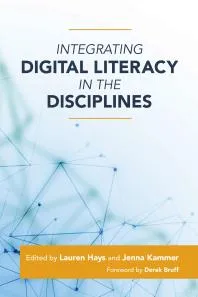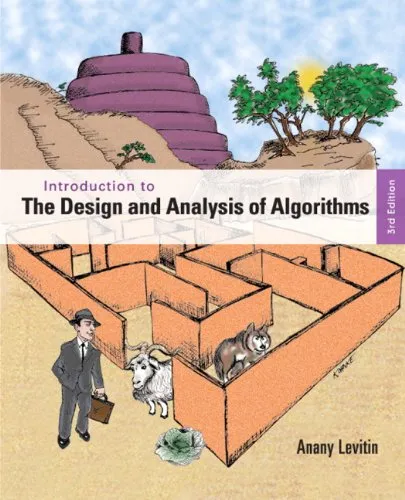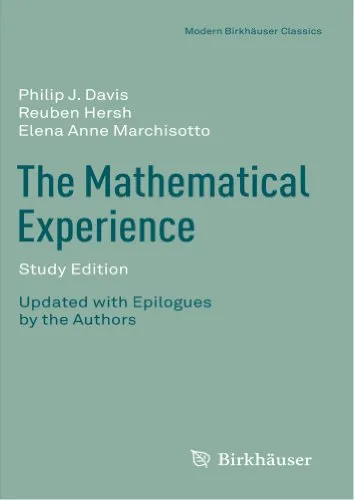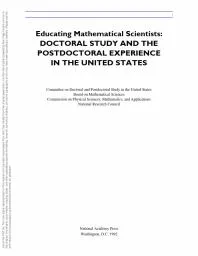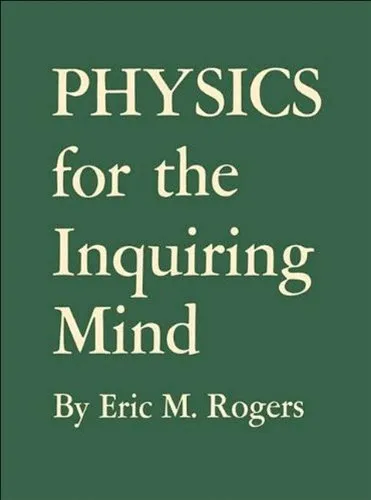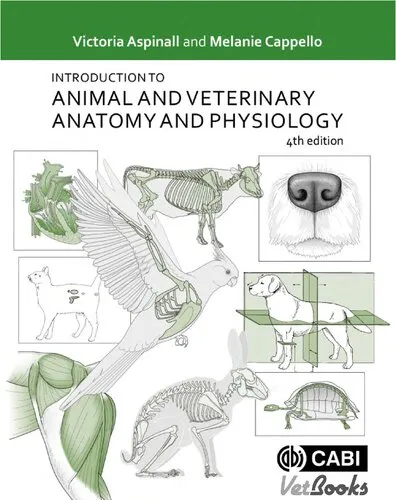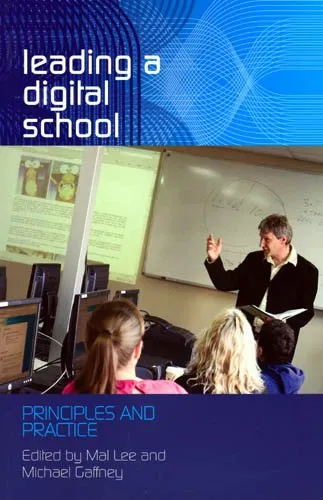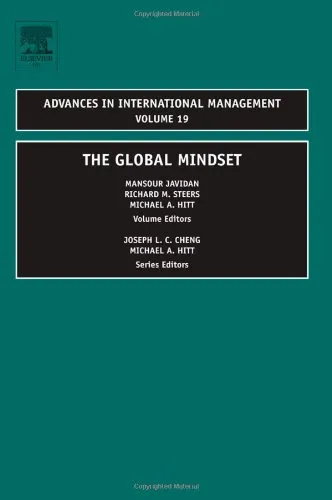Integrating Digital Literacy in the Disciplines
4.7
بر اساس نظر کاربران

شما میتونید سوالاتتون در باره کتاب رو از هوش مصنوعیش بعد از ورود بپرسید
هر دانلود یا پرسش از هوش مصنوعی 2 امتیاز لازم دارد، برای بدست آوردن امتیاز رایگان، به صفحه ی راهنمای امتیازات سر بزنید و یک سری کار ارزشمند انجام بدینRelated Refrences:
معرفی کتاب
کتاب Integrating Digital Literacy in the Disciplines اثر «Lauren Hays» و «Jenna Kammer»، راهنمایی جامع برای ادغام سواد دیجیتال در رشتههای مختلف دانشگاهی است. این کتاب به بررسی ابزارها، مهارتها و روشهای گوناگون میپردازد تا یادگیری موثر با استفاده از تکنولوژی دیجیتال در حوزههای مختلف علمی تسهیل شود.
خلاصه جامع کتاب
«Integrating Digital Literacy in the Disciplines» به گونهای طراحی شده که حرفهایهای آموزش عالی و اساتید دانشگاه بتوانند دانشجویان خود را برای جهان دیجیتالی آماده کنند. این کتاب موضوعات مختلفی از جمله نقش سواد دیجیتال در آموزش، تحلیل جنبههای کاربردی ابزارهای دیجیتال، و نحوه ارزیابی مهارتهای دانشجویان را پوشش میدهد. نویسندگان بر این باورند که سواد دیجیتال فقط محدود به یادگیری نحوه استفاده از فناوری نیست، بلکه شامل توانایی تحلیل اطلاعات، تفکر انتقادی، و تعامل موثر در فضای دیجیتال نیز میشود. این اثر همچنین نمونههایی عملی از پروژهها و فعالیتهایی که میتواند برای تعلیم دانشجویان در رشتههای گوناگون استفاده شود را ارائه میکند.
این کتاب نه تنها روشهایی برای تقویت سواد دیجیتال معرفی میکند، بلکه نشان میدهد چگونه این سواد میتواند به شکل یک چارچوبی قوی برای بهبود نتایج یادگیری و توسعه مهارتهای قرن ۲۱ عمل کند. تمرکز اصلی کتاب بر همسویی میان فناوریهای دیجیتال و اهداف یادگیری هر رشته خاص است.
نکات کلیدی
- تأکید بر اهمیت سواد دیجیتال در دنیای مدرن.
- معرفی چارچوبهای عملیاتی برای پیادهسازی دیجیتالسازی در آموزش.
- نشان دادن چگونگی تطبیق نیازهای دانشجویان هر رشته با ابزارهای دیجیتال خاص.
- تحلیل انواع پروژهها و ابزارهایی که میتوان از آنها برای تقویت یادگیری استفاده کرد.
- بررسی نقش همکاری و تفکر انتقادی در رشد مهارتهای دیجیتال دانشجویان.
جملات معروف از کتاب
“To effectively prepare students for the digital age, education must move beyond just teaching tools. We must teach them to think critically and adapt dynamically.”
“Digital literacy is not just a skill, it’s a mindset – one that empowers learners to navigate, critique, and craft in a digital world.”
چرا این کتاب مهم است
سواد دیجیتال به یکی از مهارتهای ضروری برای همه افراد در عصر فناوری تبدیل شده است. کتاب Integrating Digital Literacy in the Disciplines بهطور خاص به مسائل و چالشهای مرتبط با آموزش و یادگیری در دنیای دیجیتال میپردازد. اهمیت این کتاب از آنجا ناشی میشود که به طور دقیق به اساتید، مربیان و طراحان دورههای آموزشی نشان میدهد که چگونه میتوان محیطهای یادگیری را تقویت کرد تا دانشجویان مهارتها و دانش لازم برای موفقیت در دنیای دیجیتال را کسب کنند.
این کتاب نه تنها برای حرفهایهای آموزش عالی مرتبط است، بلکه میتواند برای هر کسی که دغدغه آموزش دیجیتال و آیندهنگری دارد، منبع الهامبخش باشد. تمرکز بر رشتههای گوناگون نیز این کتاب را به یک منبع جامع و کاربردی تبدیل کرده است که برای طیف وسیعی از متخصصین مورد استفاده قرار گیرد.
Introduction to "Integrating Digital Literacy in the Disciplines"
"Integrating Digital Literacy in the Disciplines" is a comprehensive guide to understanding and applying the principles of digital literacy within various disciplinary contexts. Written by Lauren Hays and Jenna Kammer, this book provides educators, students, and professionals with actionable strategies for fostering digital literacy. With the rapid advancement of technology and its integration across all facets of education and work environments, this book addresses the critical need to equip individuals with the skills and knowledge to navigate and create in the digital age.
Digital literacy is no longer just an optional skill; it is a foundational element of modern learning and professional success. This book examines the role that digital literacy plays in different disciplines, from the sciences and humanities to business and fine arts. It emphasizes the importance of embedding digital literacy into curriculum design, teaching strategies, and learning activities. By exploring real-world examples and offering practical insights, the authors aim to inspire educators to integrate digital tools and methodologies effectively into their practice. Additionally, this book serves as a cornerstone for rethinking what literacy means in the 21st-century classroom and workplace.
Detailed Summary of the Book
The book is structured to provide a rich exploration of digital literacy from multiple perspectives, ensuring its relevance to diverse disciplines and educational practices.
The journey begins with an in-depth explanation of what digital literacy entails. Hays and Kammer define it as the ability to critically use digital technologies to find, evaluate, create, and communicate information. From this foundation, the book delves into the specificities of how digital literacy applies to different disciplines. For example, how a science educator might incorporate data visualization and coding tools into their curriculum differs significantly from how a humanities instructor might use digital archives or social media platforms.
The narrative progresses to guide readers through the six essential elements of digital literacy: functional skills, critical thinking, creativity, ethics, collaboration, and cultural understanding. Each of these elements is contextualized within diverse disciplinary settings, helping educators and professionals address the digital needs of their specific fields. The book also highlights emerging trends, such as artificial intelligence, data privacy, and digital citizenship, and their implications for teaching and learning.
Furthermore, the book provides a plethora of case studies and teaching strategies. These examples showcase how educators around the world have successfully integrated digital literacy into their disciplines, creating engaging and transformative learning experiences for their students. Hays and Kammer also present step-by-step frameworks that empower readers to take actionable steps in their teaching or organizational settings.
Key Takeaways
- Digital literacy is essential for 21st-century learners and professionals, regardless of discipline or career path.
- The integration of digital tools must align with the unique needs of each discipline to be effective and meaningful.
- Successful digital literacy education involves a blend of foundational skills, ethical awareness, and critical thinking.
- The book provides educators with practical tools to design curriculum strategies that bridge traditional learning with digital innovation.
- Cultural awareness and ethical considerations are crucial parts of digital literacy in an interconnected world.
Famous Quotes from the Book
"Digital literacy is not simply about teaching students how to use technology, but how to think, create, and connect in a world increasingly mediated by digital tools."
"Each discipline offers its own lens to view the world, and within that lens are unique digital tools and approaches that can enrich learning and professional practice."
"As educators, our responsibility extends beyond teaching functional skills; we must instill the ethical and collaborative mindsets necessary for navigating the digital world."
Why This Book Matters
The digital transformation of education, industries, and everyday life accentuates the vital need for digital literacy. "Integrating Digital Literacy in the Disciplines" serves as a practical and theoretical resource for those seeking to better understand and teach digital competence in meaningful ways. This book matters because it addresses the gap between technology's potential and its application in learning environments. By grounding digital literacy within the context of individual disciplines, Hays and Kammer create a roadmap for educators and leaders to empower the next generation of learners and workers.
Moreover, the book emphasizes the human side of digital tools—how they can foster creativity, collaboration, and critical reflection when used thoughtfully. It is an invaluable text for educators, curriculum designers, administrators, and even students aiming for a deeper awareness of how digital tools can enhance knowledge production and sharing. This book provides not only philosophical insights but also hands-on strategies for adapting to a digitally-connected future.
دانلود رایگان مستقیم
شما میتونید سوالاتتون در باره کتاب رو از هوش مصنوعیش بعد از ورود بپرسید
دسترسی به کتابها از طریق پلتفرمهای قانونی و کتابخانههای عمومی نه تنها از حقوق نویسندگان و ناشران حمایت میکند، بلکه به پایداری فرهنگ کتابخوانی نیز کمک میرساند. پیش از دانلود، لحظهای به بررسی این گزینهها فکر کنید.
این کتاب رو در پلتفرم های دیگه ببینید
WorldCat به شما کمک میکنه تا کتاب ها رو در کتابخانه های سراسر دنیا پیدا کنید
امتیازها، نظرات تخصصی و صحبت ها درباره کتاب را در Goodreads ببینید
کتابهای کمیاب یا دست دوم را در AbeBooks پیدا کنید و بخرید
1305
بازدید4.7
امتیاز0
نظر98%
رضایتنظرات:
4.7
بر اساس 0 نظر کاربران
Questions & Answers
Ask questions about this book or help others by answering
No questions yet. Be the first to ask!
